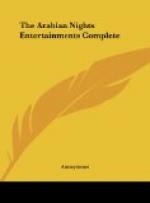on the savage infidel. An opportunity happened
that same night. The prince having composed his
mind, finished his work, and when the Jew arrived
to examine it, dissembled so well, that no appearance
of his inward melancholy was displayed. The Jew
applauded his diligence, and taking him home, made
him sit down to supper with himself and family, consisting
of a wife and two young lads. It being the middle
of summer, and the weather sultry, they retired to
sleep on the open terrace of the house, which was
very lofty. In the dead of night, when the Jew
and his family were fast locked in the arms of slumber,
the prince, who had purposely kept himself awake, seized
the sabre of the treacherous infidel, and with a dexterous
blow struck off his head; then snatching up the two
children, hurled them headlong from the terrace, so
that their brains were dashed out on the stone pavement
of the court below. He then uplifted the sabre
to destroy the Jew’s wife, but the thought that
she might be of use to him withheld his hand.
He awoke her gently, commanded her to make no noise,
and follow him down stairs, where, by degrees, he
informed her of his adventures, the discovery he had
made of the murder of his brothers, and his revenge
on her treacherous husband and ill-fated children,
whom, however, he would not have destroyed had he
not been apprehensive of their cries alarming the
neighbourhood. The Moosulmaun woman, for such
she secretly was, did not regard the death of the wicked
Jew, who had married her against her will, and often
used her with great harshness, and her sorrows for
the children were softened by the salvation of her
own life. She also felt sentiments of tenderness
towards the prince, whose injuries in the murder of
his unfortunate brothers had compelled him to revenge,
and felt herself obliged to his mercy in letting her
live. She now informed him that in the Jew’s
laboratory were many valuable medicines, and among
them the very water of life he was in search of; which
intelligence was most gratifying to the prince, who
offered to take the woman under his protection, and
she willingly consented to accompany him to a country
inhabited by true believers. Having packed up
the medicines, with some valuable jewels, and put
them, with various refreshments and necessaries, on
two camels, they mounted and left the city undiscovered,
nor did any accident occur on their journey; but on
reaching the capital of China, the prince found that
his father was dead, while his mother, contrary to
expectation, lingered in painful existence. The
ministers, who had with difficulty, in hopes of the
three brothers’ arrival, kept the next relations
of the throne from disputing their right to ascend
it, were rejoiced at his return; and on being informed
of the untimely end of the two elder princes, immediately
proclaimed him sultan. His first care was to
administer comfort and relief to his afflicted mother,
on whom the water of life had an instantaneous effect;
his next, to regulate the affairs of his government,
which he did with such ability, justice, and moderation,
that he became endeared to his subjects, and an example
to other sovereigns.




